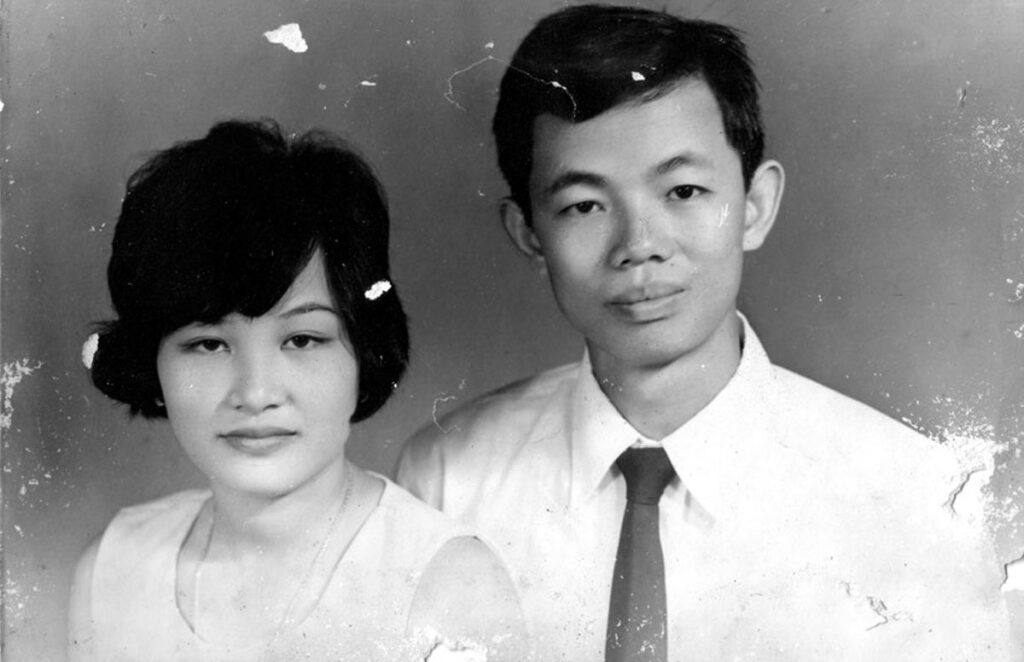My wife and I are Cambodian Chinese, but we cannot speak Chinese. We did not meet until our wedding day, even though we are great cousins. Our parents arranged our marriage, and as their son, I did not dare say no to them. Our wedding ceremony was celebrated based on both Chinese and Khmer customs. My parents were conservative, so we had to wear traditional clothing. I only wore a single suit, but my wife wore two dresses; one was red and pink. After the Khmer Rouge regime, my older sister told me that she exchanged our wedding clothes for rice. She thanked me, saying she would have starved to death without them.
My wife carried a handkerchief to hold money; Cambodian women at that time did not carry purses often. She sewed it herself; she liked sewing and embroidering. She would sew many kinds of flowers on her clothing and embroider pillowcases.
We loved each very much. After our wedding, we had an above-average standard of living. She stayed home and looked after the children, while I sold sugar palm in the market. In one year, I sold hundreds of jars of sugar palm and earned a large sum of money.
We moved often. We first lived in my in-laws’ house in Kampong Speu Province and then in Phnom Penh. Eventually, I saved enough money to buy a car and ran a taxi from Phnom Penh to Battambang Province.
I was driving my taxi in the early 1970s; Lon Nol soldiers often drove in front of the cars then to guard our safety because the Khmer Rouge soldiers would ambush us along the road. As the situation became worse, I decided to abandon my taxi route and buy a new mini-car instead. I ran it as a taxi inside Phnom Penh.
One night, my cousin was lighting a kerosene lamp and set his house on fire. There was a strong wind, which caused the fire to spread. It killed my brother’s child and destroyed 17 houses, including mine. All I had left was my mini-car and the money in my pocket. I took the money I had left and bought shoes with it because I had run out of the house in my bare feet. Lon Nol soldiers detained us in the security office for a while after that; they suspected that my family had set the fire. The newspapers wrote about the event, saying “Lao Sokh Kea, a Chinese, caused a fire in order give the enemy a chance to come into the country.”
On the liberation day in 1975, many bombs were dropped near my house. People could not travel anywhere, so I also stopped running the taxi. I took my wedding clothes to my cousin’s house in Phnom Penh for safekeeping, just before my family was evacuated. I hired a boat to go to my wife’s home village, but the Khmer Rouge soldiers ordered us to Kandal Province instead.
My wife often traded things. When we first arrived in Kandal, she traded the three buckets of rice she brought from home for gold. Later, she exchanged that gold for more rice. But when the Angkar started cooperatives, there was little left to trade. I could not fill my stomach and ate only rice soup and vegetables. There was no meat and the soup was awful.
We had to work hard. One time, my son did not go to work in the rice field, so a cadre took him away to punish him. He pushed my son’s head under water, put out his cigarette on my son’s body, and then put biting ants on him. I consoled my son and told him to go to work in the field so he would not be punished again.
Living with local people gave my family many troubles. Neighbors called us “A-Chin!” because my skin was fair and I looked Chinese. The Angkar overheard this mocking word and ordered me to dig 25 bulb plantation rows in one day. If I could not complete this task, they said, I would be killed.
Just before 1979, the Angkar asked all the villagers to attend a meeting in the jungle around 3 or 4 o’clock in the morning. I was in the field, but when my wife arrived, she saw cadres running in different directions, and heard the sounds of gunfire and bombs drawing near. “Please don’t worry, the fighting is along the border,” a cadre said. But soon all the villagers at the meeting also began running. She and the children ran to find me and we were reunited.
On liberation day, I saw a Khmer Rouge document with my name on it. It said I was an ex-soldier and that my wife was a lazy worker. It gave the names of the two base people who reported me. I had never had any arguments with anyone, so I did not understand why these people wanted to hurt me.
Even today, I detest the word “Comrade,” which was often used during the Khmer Rouge meetings. I sometimes hear it on the television, and immediately turn it off. I do not want to hear this word ever again.

